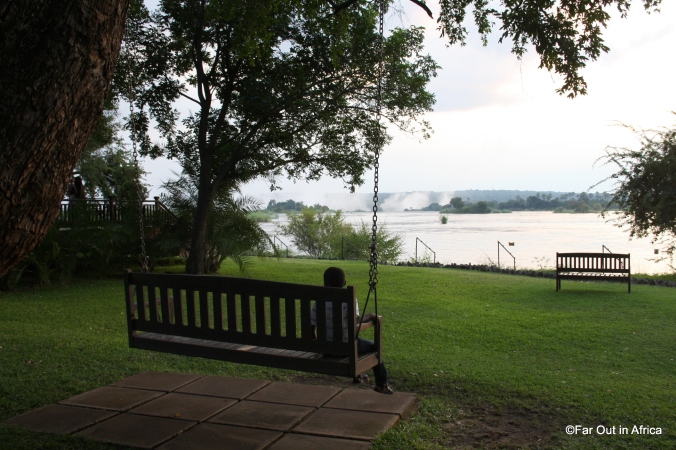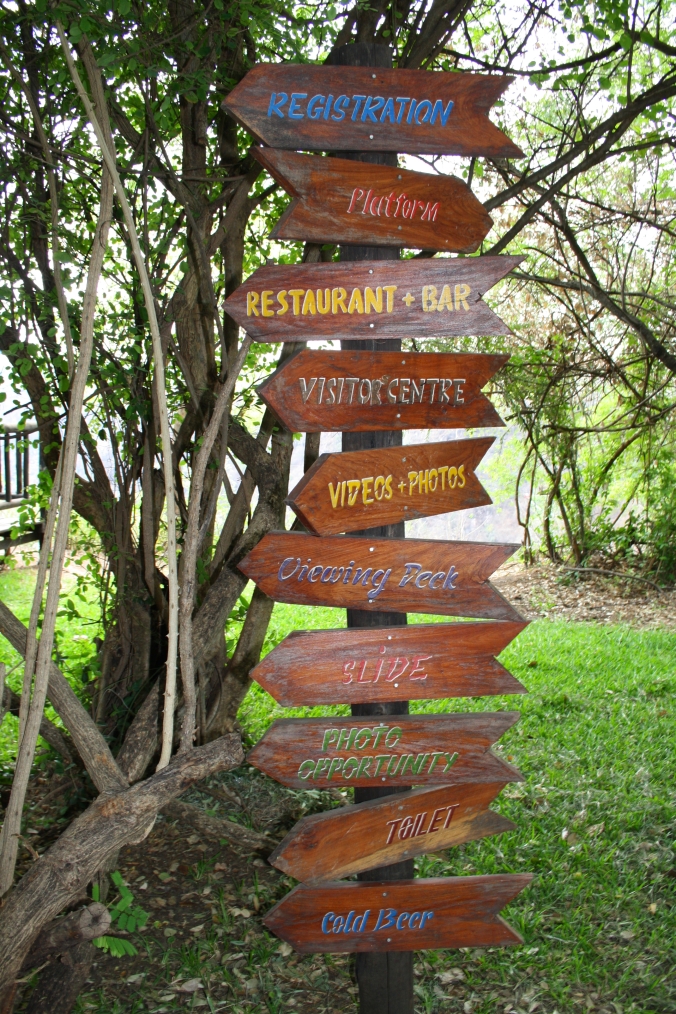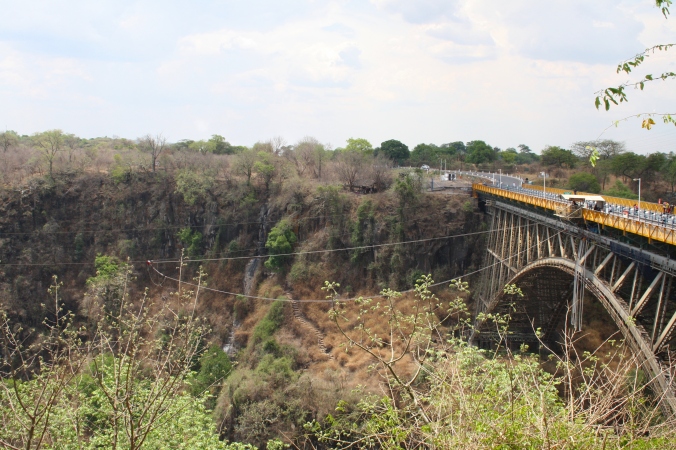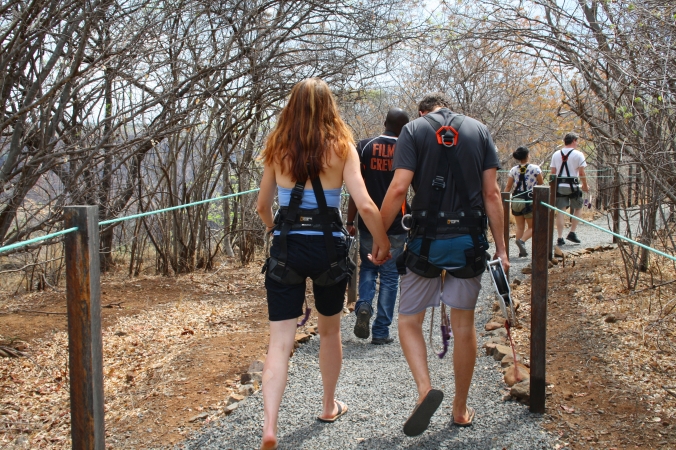Heyjude is looking for benches with a view for the month of April.
I thought I would get in two more of the pictures I took last week while strolling around the grounds at the Royal Livingstone Hotel.


Heyjude is looking for benches with a view for the month of April.
I thought I would get in two more of the pictures I took last week while strolling around the grounds at the Royal Livingstone Hotel.


I love taking pictures of sunsets. Every evening here is breathtaking and I have hundreds (possibly thousands?) of sunset pictures filed away in my not-so-organised filing system. So when I saw this week’s A Photo a Week Challenge: Flare I knew I would be able find something suitable. The problem was choosing just one photo!
I took this photo of a flock of African Open-billed Storks (Anastomus lamelligerous) a few years ago, while bobbing about in a boat on the Zambezi River – just above the Victoria Falls.
Victoria Falls could be called the Adventure Capital of Africa. There is so much here for the thrill-seeker, from Bungee jumping to white water rafting, from riding elephants to walking with lions and just about everything in between.

Last November my Last Born, who now lives in the UK, came to stay and brought his delightful English Lass with him for her first trip to Africa.
When he was nine years old we had visited Victoria Falls, he had seen those crazy people who like to throw themselves off perfectly good bridges and from that day it became his dream to do the same. Of course he was young then and I could still tell him what he could and couldn’t do but now he is an adult there is not much I can do about it.
So one day I took them Bungee jumping.

Bungee!
Not for the faint hearted
Arriving to register (and to sign their lives away on what is probably a pretty water-tight indemnity form) we were greeted by this innocuous notice:

OK. I could probably do this
Then we saw this (that little box on the side of the bridge is where you stand before falling into the abyss):

Perhaps not
And then this:

Nope!
Reading the words on that indemnity form caused English Lass to have second thoughts (I don’t blame her!).

But Last Born, being quite persuasive got her to agree to do a tandem jump with him. Somehow the idea of being strapped to her nearest and dearest while falling 111 metres (365 feet) felt safer.

Even my knees were shaking
Apparently doing the Zip Line is the perfect way to prepare yourself for the Bungee, but it still looked pretty scary to me.

Weeeeeeee!
And then for the pièce de résistance. The Granddad of adrenalin rushes. The Bungee.
It was terrifying for me standing on that bridge (which shook and trembled as heavy-duty transport lorries trundled across in single file) watching my child launch himself into the air and then fall 111 metres – albeit attached to someone else and to a long rope. I think I shook and trembled more than those lorries.

Stepping forward. Into nothing
Even hanging over the bridge rails taking these photos gave me a head rush!

It’s a very Long Way Down

And when I thought my ordeal was over English Lass, now overcome with adventure and excitement, agreed to jump on her own and they both had another go.

3-2-1 Bungee!!

As close to flying as you’ll ever get without wings

Bouncing up and down above the rocks, waiting to be pulled up to the bridge

A little “illegal border jumping” adding to the excitement of the day
This was Last Born’s first visit back to Africa in five years and I think that day was the highlight of his trip. My highlight of the day was when we walked off that bridge and the ground wasn’t shaking.
This is our last week of the Five Elements/Seasons series and today our topic is Water or the Season of Winter.
The World’s largest sheet of falling water, the Victoria Falls (or Mosi-oa-Tunya, meaning The Smoke that Thunders in Tokaleya-Tonga) is listed as one of the Seven Natural Wonders of the World – and it falls almost in my front garden!

Zambia on the North bank, Zimbabwe on the South. The Zambezi River stretching Northwards as far as the eye can see
Weekly Photo Challenge – Zigzag
I have tried many times to photograph the full moon but my attempts are usually hopeless.
So I was delighted with this eerie result.
I have a farm in Africa.
Well, I don’t but Piet does, although to be quite correct, he doesn’t have a farm, he leases it – as does every farmer in this part of the world.
It is a 560Ha farm, split into two sections; one large one and one small. The larger section, which we have named Sitikela Farm (sitikela means roller – a beautiful, colourful bird which occurs in this area – in Lozi), sits proudly on top of ancient sand dunes, blown in from the Kalahari Desert over millennia and boasts panoramic views of the mighty Zambezi River. In some places you can even see on the horizon the mist rising high and billowing cloud-like from the Mosi oa Tunya (or Smoke That Thunders), more commonly known as the Victoria Falls, one of the Seven Wonders of the World.

This picture was taken some years ago – now this magnificent view is marred by an ugly cellphone tower.
Photo credit: Piet
The second, smaller section is about 7km away, situated on the banks of the Zambezi River.
During the winter months we grow wheat and seed-maize (corn). The seed from the maize we grow is sold to other farmers and ultimately their produce is ground into ‘mealie-meal’, the staple food for the indigenous people around here. We truck the wheat off to millers about 400km away where they turn it into flour.
It so happens that also in the winter months it does not rain, the bush dries, the grass dies and the locals start burning what’s left. This leaves very little food for the many large herds of elephants (and other game in the area) to eat – and so they all come to our farm!
We employ a number of Security/Elephant Guards who work in pairs and who are armed with a stash of fire-crackers. In theory, their job is to patrol along the edges of the fields at night, listening for elephants. As soon as they hear elephants approaching they are supposed to throw a few crackers to scare them off and then radio ‘control’ who alerts Piet, either via radio or telephone, so that he can go and back them up with more fire-crackers and the added pressure of a vehicle.
In practice what they often do, unfortunately, is sleep, while the elephants take their fill.
It was very frustrating (and expensive!) for Piet to wake up after a full night’s ‘elephant-free’ sleep, only to discover half the crop eaten, and the other half trampled flat by elephants. So he devised a system for keeping everyone awake and alert – this works very well. Every 15 minutes control calls each station on the radio, asking for their sit rep (or situation report). If all is quiet they reply by saying November Tango Romeo (Nothing To Report). This standardisation of reply avoids the confusion of multiple answers, such as “Ah, it is just cool” or “It is just OK” or even “ What is the football score?”. If there are elephants near the response is supposed to be ‘Echo India Lima’ – Elephants In Lands – but all protocol is usually forgotten in the excitement and one evening we were amused to hear frantic shouting over the radio:
“November tang romeo! November tango romeo! But tell the bwana to come fast! The elephants, they are many!”.
In addition to the guards we also have 20 Km of electric fencing around the borders of the lands.
But we found that this did not really deter them. Elephants are very intelligent creatures and sometimes they push a foot against one of the poles, the fence falls flat, they step daintily between the wires and voilà! Pudding time! Other times they are not as delicate or thoughtful; Piet has witnessed teenage bulls pushing their younger and smaller siblings or cousins through the fence – those unfortunate babies squealing in anticipation of the pain, even before they reach the fence!
So another plan had to be devised. We have now connected the wires on the fence to an alarm which is activated if the circuit is broken. We at least then know there has been a breach and can scramble into action.
Last year we were visited by a man who had heard of our plight. He said he has devised a method of keeping elephants out of villagers’ crops in Kenya using flashing strobe lights attached to poles. By all accounts this system works but only when there is a light every 10m – that would mean at least 2000 lights for us and the cash layout would just be too great for an operation our size.
Sometimes we are lucky. If the wind is blowing in the right direction all it takes is the sound of the vehicle starting up in our yard for the elephants to hurriedly leave. But other times not so lucky; many nights Piet gets his first call-out before the sun has set and only returns home after sunrise the next day. He then has to carry on his business of farming, maybe catching a few minutes sleep in the late afternoon before the next incursion. On some occasions we have had over 100 elephants on the farm. It’s almost as if it’s a planned military exercise – they split up into groups, dashing out of one field as the vehicle approaches, into the bush and then into the next field. You can imagine them laughing and thumbing their trunks at these futile attempts to keep them away from the food. At times like these he will often call in one of the drivers to assist with a tractor. Or he will enlist the help of friends who have popped in for dinner – however we have found visitors are scarce during the Elephant Season!
Chasing elephants is an exhausting and dangerous job. But it has to be done if the bills are to be paid. And unless the villagers can be persuaded to not set fire to everything in winter, it is something that we are going to be doing forever.
"Summer is the Season of Inferior Sledding" -- Inuit Proverb. Martha Ann Kennedy's Blog, Copyright 2013-into perpetuity, all rights reserved to the author/artist.
The ramblings and photos of a Naturalist
For Exceptional People Everywhere
Join me in the cold, dark, life-sustaining NE Pacific Ocean to discover the great beauty, mystery and fragility hidden there.
Keeper of fluttery thoughts
Exploring the Reptiles and Amphibians of Africa
Medieval History, Pop Culture, Swearing
Live Life Write
Columns. Letters. Rants. Stuff.
My thoughts, sentiments, and scribbles on womanhood
Steve Harrison and Janine King's other Hot and Sticky web site
Little windows into my world.
Just Doing My Best to Communicate Science
Fun With SCIENCE!
trials and tribulations of a quaterlife crisis
For people with Non-24-Hour Sleep Cycles
Lisa Batten Kunkleman
BLIND WILDERNESS
an irreverent look at UK politics
Ruminations and reflections on the world of literature...
debunking the reasons people don't vax
A LOT OF P'S WITH A BIT OF QUIRKINESS THROWN IN FOR GOOD MEASURE.
Growing with gratitude for life's challenges
Wits End Photography
Exploring my world with pictures and words.
photography, poetry, paintings
Photographing.... that one moment in time...
All Is One With Our Creator
age is just a (biggish) number
Everyone Has Something To Teach Us
To participate in the Ragtag Daily Prompt, create a Pingback to your post, or copy and paste the link to your post into the comments. And while you’re there, why not check out some of the other posts too!
Creative Exploration in Words and Pictures
To See a World in a Grain of Sand...
I write to figure out what is left
Fun, Photography & Friends
An onion has many layers. So have I!
Stories, Prompts, and Musings
A blog about blood-brain barrier, science, metal, old-school gaming and other geeky stuff
Looking at the conflict around the world.
Do you want to beat the bite of mosquitoes? This is a summary of research projects and publications dealing with mosquitoes, mosquito-borne disease, insect repellents, urban wetlands and urban ecology (as well as other Medical Entomology activities) by Dr Cameron Webb (University of Sydney & NSW Health Pathology)
Fighting pseudoscience and quackery with reason and evidence.
Seldom original. Often wrong. Occasionally interesting.
Studying the glorious work of those who want to do your thinking for you